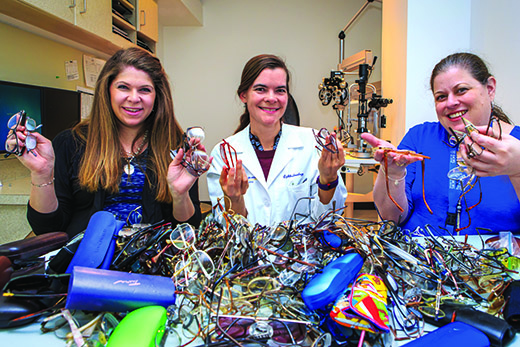Imagine being in desperate need of eyeglasses to handle even the simplest of tasks but not having the resources to get those glasses. Then imagine a program that provides prescription glasses — for free — to people who might not be able to get them otherwise.
That was the scenario Rebecca Neustein (an Emory medical student at the time) encountered when she visited a friend at Duke Eye Center in 2015. Neustein’s friend and some other students had gotten involved with ReSpectacle, a nonprofit program that collects prescription eyewear and then uses the internet and local ReSpectacle chapters to distribute the glasses to people in underserved communities.
Neustein returned to Emory, ready to spread the word about ReSpectacle and gauge interest in starting a chapter. She found support in pediatric ophthalmologist Phoebe Lenhart, MD, and orthoptist Marla Shainberg.
Since that time, medical students in the Emory Ophthalmology Interest Group (OIG) have organized a local chapter and started making differences in people’s lives. Members of the Emory ReSpectacle chapter meet every two months to clean and inventory the donated eyeglasses. They then log the details about each pair and upload the information to the ReSpectacle website: the prescription, frame color, size and condition of the lenses and frame.
”ReSpectacle has more than 21,000 pairs of eyeglasses online,” says Neustein, who has completed her medical school education and matched for an ophthalmology residency at Emory Eye Center. “Patients or providers can search for a prescription and see what’s available. Once they choose a pair, it’s shipped to the patient for free. Grant funding covers the cost.”
More than 300 pairs of eyeglasses have been processed and entered into the database by the Emory chapter. Approximately 100 more pairs have been donated, but the group is always looking for more.
“ReSpectacle has 23 chapters across the country, but Emory and Duke are the only ones that collect glasses for children,” Shainberg says. “We’re always happy to get any donations, but there’s a special need for pediatrics.”
One reason for this is that pediatric patients need new glasses more often. And many young families might not have the financial resources to pay for the frequent glasses changes required by their children, Lenhart says.
“A baby’s focusing power changes rapidly in the first year of life,” Shainberg explains. “Medicaid only covers one pair of glasses a year, so that doesn’t work for these patients. Remember, when a child has cataract surgery, her ability to focus up close is gone. The only way she can get that back if contact lens wear is not feasible is with glasses — the glasses are her eyes.”
“When a child cannot focus, the brain doesn’t learn how ‘see’ clearly,” Lenhart adds. “Therefore, young children who need eyeglasses cannot go without them for even short periods of time without the risk of permanent vision loss.”
Knowing about ReSpectacle can help parents prevent vision loss in their own children as well as help others.
”Our hope is that the parents will return the pair they already have when their child gets an updated prescription,” Shainberg says. “That way we can put the first pair back in the database to hopefully redistribute to someone else.”
So far, the Emory ReSpectacle chapter has mailed nearly 150 pairs of eyeglasses to patients who found a match through the website. They’ve also helped patients connect with ReSpectacle and get the glasses they need through community vision screenings and clinic appointments at Grady Memorial Hospital.
"Many of these individuals are dealing with incredibly challenging social and financial situations that make even going to the doctor difficult,” Neustein says. “They are so grateful when they find out that their glasses are not only free, but that getting them requires no additional travel on their part.”
"I love the ReSpectacle program because it’s a great opportunity to impact a person’s life,” she adds. “The glasses might not be perfect, but they’re better than nothing and are vital for some people to get through their daily lives. They can make a huge difference.”

